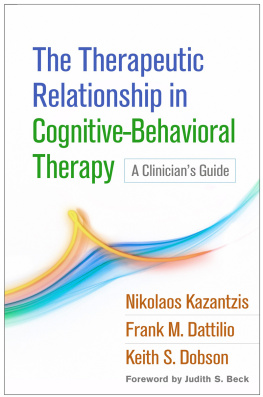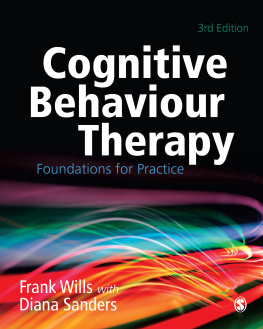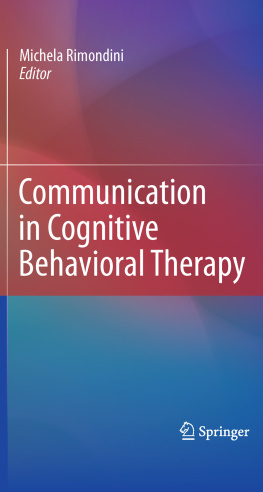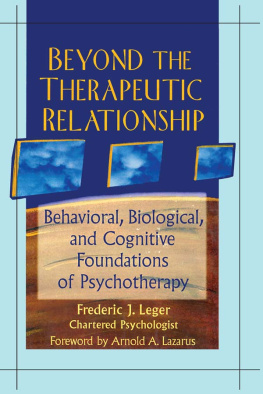Case Studies in Couple and Family Therapy: Systemic and Cognitive Perspectives
Edited by Frank M. Dattilio
Cognitive and Behavioral Theories in Clinical Practice
Edited by Nikolaos Kazantzis, Mark A. Reinecke, and Arthur Freeman
Cognitive-Behavioral Strategies in Crisis Intervention, Third Edition
Edited by Frank M. Dattilio and Arthur Freeman
Cognitive-Behavioral Therapy with Couples and Families: A Comprehensive Guide for Clinicians
Frank M. Dattilio
Cognitive Therapy with Children and Adolescents, Second Edition: A Casebook for Clinical Practice
Edited by Mark A. Reinecke, Frank M. Dattilio, and Arthur Freeman
Evidence-Based Practice of Cognitive-Behavioral Therapy, Second Edition
Deborah Dobson and Keith S. Dobson
Handbook of Cognitive-Behavioral Therapies, Third Edition
Edited by Keith S. Dobson
The Therapeutic Relationship
in Cognitive-Behavioral
Therapy A Clinicians Guide
Nikolaos Kazantzis
Frank M. Dattilio
Keith S. Dobson
Foreword by Judith S. Beck

THE GUILFORD PRESS
New York London
Epub Edition ISBN: 9781462531301; Kindle Edition ISBN: 9781462531318
Copyright 2017 The Guilford Press
A Division of Guilford Publications, Inc.
370 Seventh Avenue, Suite 1200, New York, NY 10001
www.guilford.com
All rights reserved
Except as indicated, no part of this book may be reproduced, translated, stored in a retrieval system, or transmitted, in any form or by any means, electronic, mechanical, photocopying, microfilming, recording, or otherwise, without written permission from the publisher.
Last digit is print number: 9 8 7 6 5 4 3 2 1
LIMITED DUPLICATION LICENSE
These materials are intended for use only by qualified mental health professionals.
The publisher grants to individual purchasers of this book nonassignable permission to reproduce all materials for which photocopying permission is specifically granted in a footnote. This license is limited to you, the individual purchaser, for personal use or use with clients. This license does not grant the right to reproduce these materials for resale, redistribution, electronic display, or any other purposes (including but not limited to books, pamphlets, articles, video- or audiotapes, blogs, file-sharing sites, Internet or intranet sites, and handouts or slides for lectures, workshops, or webinars, whether or not a fee is charged). Permission to reproduce these materials for these and any other purposes must be obtained in writing from the Permissions Department of Guilford Publications.
The authors have checked with sources believed to be reliable in their efforts to provide information that is complete and generally in accord with the standards of practice that are accepted at the time of publication. However, in view of the possibility of human error or changes in behavioral, mental health, or medical sciences, neither the authors, nor the editor and publisher, nor any other party who has been involved in the preparation or publication of this work warrants that the information contained herein is in every respect accurate or complete, and they are not responsible for any errors or omissions or the results obtained from the use of such information. Readers are encouraged to confirm the information contained in this book with other sources.
Library of Congress Cataloging-in-Publication Data is available from the publisher.
ISBN 978-1-4625-3128-8
To Aaron T. Beck
Our mentor, teacher, and inspiration
Nikolaos Kazantzis, PhD, is Associate Professor in the School of Psychological Sciences and the Institute for Cognitive and Clinical Neurosciences at Monash University (Australia), where he directs the clinical training program and Cognitive Behaviour Therapy Research Unit. He has an active funded research program studying various aspects of treatment process, with a particular emphasis on depression and cognitive-behavioral therapy (CBT). He is a recipient of many prestigious professional awards, including the Beck Scholar Award for Excellence in Contributions to Cognitive Therapy from the Beck Institute for Cognitive Behavior Therapy, presented by Dr. Aaron T. Beck and Dr. Judith S. Beck. Dr. Kazantzis is a Fellow of the Australian Psychological Society, a current board member of the International Association of Cognitive Psychotherapy (IACP), and the IACP delegate for Australia. He is Associate Editor for the British Journal of Clinical Psychology, Cognitive Therapy and Research, and the International Journal of Cognitive Therapy, and has published over 100 peer-reviewed publications and 6 books, including The Therapeutic Relationship in Cognitive-Behavioral Therapy and Using Homework Assignments in Cognitive Behavior Therapy. Dr. Kazantzis has developed CBT training programs for over 6,000 professionals and has presented workshops in 20 countries.
Frank M. Dattilio, PhD, ABPP, is a Teaching Associate (part-time) in Psychiatry at Harvard Medical School and Clinical Associate in Psychiatry at the University of Pennsylvania School of Medicine. He is also a practicing clinical psychologist in Allentown, Pennsylvania, where he provides individual, couple, and family therapy. Dr. Dattilio has presented extensively throughout the world on treating a wide range of disorders using CBT and has been active in research, professional education, training, and supervision of psychiatrists and mental health professionals. His more than 300 publications include 23 books in the areas of couple and family therapy, anxiety and behavioral disorders, and clinical and forensic psychology. Dr. Dattilio serves on the editorial boards of a number of professional journals and is the recipient of numerous awards for outstanding achievement in the fields of psychology and psychotherapy.
Keith S. Dobson, PhD, is Professor of Clinical Psychology at the University of Calgary, Alberta, Canada, and a Principal Investigator for the Opening Minds program of the Mental Health Commission of Canada, with a focus on stigma reduction in the workplace. His research has focused on both cognitive models and CBT for depression. Dr. Dobson has published over 230 articles and chapters, 13 books, two DVDs, and one DVD series. He is a past president of the Canadian Psychological Association (CPA), the Academy of Cognitive Therapy, and the IACP. Dr. Dobson is a recipient of the Award for Distinguished Contributions to the Profession of Psychology and the Donald O. Hebb Award for Distinguished Contributions to the Science of Psychology from the CPA, among other honors.
W hy is the therapeutic relationship so important in the delivery of effective cognitive-behavioral therapy (CBT)? To answer this question, one needs to examine the essence of CBT, a task that is admirably accomplished in this book.
CBT is not merely a collection of techniques. Although you need to know how to select and effectively implement techniques (some of which are adapted from a variety of other psychotherapeutic modalities), to effectively deliver CBT you also need to engage clients. Further, you need to develop an accurate cognitive conceptualization of the individual client, which you refine at each session. You also need to develop a strong therapeutic alliance so that clients can focus on the difficulties they will experience when they leave your office instead of spending undue time in session having automatic thoughts about you, about themselves in relation to you, or about the process of therapy.
Next page










